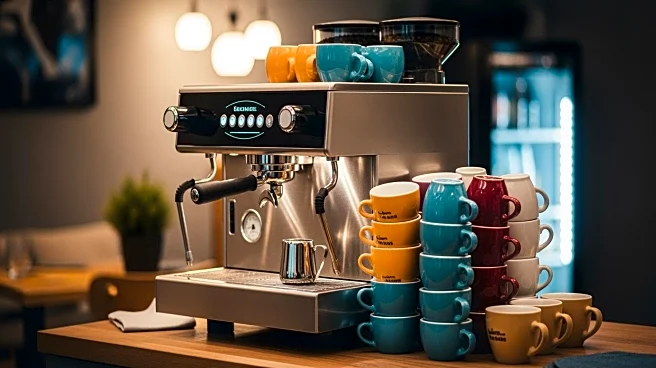What's Happening?
Convenience-store retailers are actively working to revitalize their coffee programs to better meet customer expectations and retain loyalty. At the National Association of Convenience Stores (NACS) show
in Chicago, industry leaders discussed strategies to enhance their coffee offerings. Steve Kapple from Casey’s General Stores highlighted the importance of understanding customer preferences and adapting coffee selections accordingly. Casey’s revamped its coffee program by introducing a broader range of blends and flavors, resulting in improved customer satisfaction. Similarly, Micah Rupprecht from Kwik Trip emphasized the challenge of maintaining market share amidst growing competition from local and national coffee brands. Kwik Trip aims to offer competitive products while maintaining value for customers. Ximena Reynoard from OXXO noted the need to differentiate their offerings from local coffee shops, especially in smaller store formats.
Why It's Important?
The efforts to enhance coffee programs are crucial for convenience stores to maintain and grow their customer base in a competitive market. As consumers increasingly seek diverse and high-quality coffee options, stores that fail to adapt risk losing customers to specialized coffee shops and national chains. By expanding their coffee offerings and aligning them with customer preferences, convenience stores can strengthen customer loyalty and potentially increase sales. This shift also reflects broader trends in consumer behavior, where quality and variety are becoming key factors in purchasing decisions. The success of these initiatives could influence other convenience stores to adopt similar strategies, impacting the overall landscape of the convenience retail industry.
What's Next?
Convenience stores are likely to continue refining their coffee programs, using customer feedback and data analytics to guide their offerings. As competition intensifies, stores may explore partnerships with coffee suppliers to introduce exclusive blends or limited-time offerings. Additionally, marketing efforts will play a crucial role in communicating the value and uniqueness of their coffee products to consumers. The industry may also see increased investment in technology and store design to enhance the coffee purchasing experience. Stakeholders, including suppliers and marketing teams, will need to collaborate closely to ensure these programs meet evolving consumer demands.








